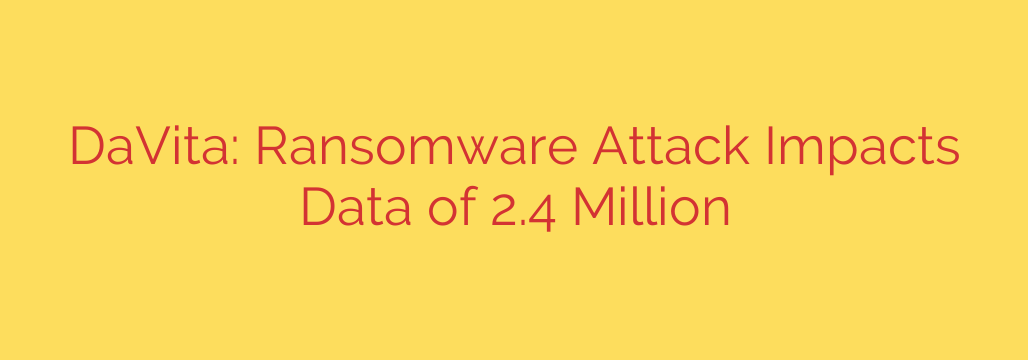
DaVita Data Breach: Personal and Medical Information of 2.4 Million Patients Exposed
DaVita Inc., a prominent provider of kidney dialysis services across the United States, has disclosed a significant data breach that exposed the sensitive personal and medical information of approximately 2.4 million individuals. The security incident was the result of a ransomware attack targeting the company’s network, highlighting the persistent and growing threat of cyberattacks against the healthcare sector.
This breach is a serious matter for current and former patients, as the compromised data is highly sensitive and could be exploited for fraud and identity theft. Understanding the details of the attack and knowing what steps to take is crucial for protecting yourself.
What Happened in the DaVita Security Incident?
According to official filings, the company detected suspicious activity on its network in May 2023. An investigation immediately followed, revealing that an unauthorized third party had gained access to a file server containing a vast amount of patient and employee data.
The investigation confirmed that this was a ransomware attack, a type of cyber intrusion where criminals encrypt data and demand payment for its release. While containing the threat, DaVita determined that the attackers had exfiltrated, or stolen, a significant volume of data before it was secured.
What Specific Information Was Compromised?
The breach exposed a wide range of highly confidential information, putting affected individuals at substantial risk. The compromised data is highly sensitive and includes a combination of personal, medical, and financial details.
The stolen information may include:
- Full Names
- Social Security Numbers (SSNs)
- Dates of Birth
- Contact Information (including addresses, phone numbers, and email addresses)
- Medical Information (such as diagnoses, lab results, and prescriptions)
- Health Insurance Information
The combination of personally identifiable information (PII) with protected health information (PHI) makes this breach particularly dangerous. This data can be sold on the dark web or used directly by criminals to commit sophisticated forms of identity theft, financial fraud, or medical fraud.
The Alarming Trend of Healthcare Cyberattacks
This incident is not an isolated event but part of a disturbing trend targeting the healthcare industry. Cybercriminals frequently attack hospitals, clinics, and healthcare providers because they are rich sources of valuable data. Medical records are often worth more than credit card numbers on illicit markets because they contain a wealth of unchangeable information that can be used to create fake identities for fraudulent billing or to illegally obtain prescription drugs.
The critical nature of healthcare operations also makes providers a prime target for ransomware, as any disruption to their systems can have life-threatening consequences, pressuring them to pay the ransom.
Actionable Steps: What to Do if You’ve Been Affected
If you believe you may have been impacted by the DaVita data breach, it is essential to take immediate action to protect yourself. DaVita is offering 24 months of complimentary credit monitoring and identity theft protection services to all affected individuals.
Here are the critical steps you should take right now:
Enroll in the Free Credit Monitoring: If you receive a notification letter from DaVita, follow the instructions to sign up for the free credit monitoring service. This will alert you to any new accounts or credit inquiries made in your name.
Place a Fraud Alert or Credit Freeze: Contact one of the three major credit bureaus (Equifax, Experian, or TransUnion) to place a fraud alert on your file. For even stronger protection, consider a credit freeze, which restricts access to your credit report and makes it much harder for thieves to open new accounts.
Scrutinize Your Accounts and Medical Statements: Carefully review all your bank, credit card, and insurance statements for any suspicious activity. Pay close attention to your Explanation of Benefits (EOB) documents from your health insurer to ensure no fraudulent medical claims are being filed under your name.
Be Wary of Phishing Attempts: Criminals may use your stolen information to launch targeted phishing scams. Be extremely cautious of unsolicited emails, text messages, or phone calls that ask for personal information, even if they appear to be from a legitimate source like DaVita or your bank.
Secure Your Online Accounts: If you used any passwords for a DaVita patient portal that you reuse elsewhere, change them immediately. Enable two-factor authentication (2FA) on all important accounts for an added layer of security.
The DaVita data breach is a stark reminder that personal data is constantly at risk. By staying vigilant and taking these proactive security measures, you can significantly reduce your risk of becoming a victim of identity theft and fraud.
Source: https://go.theregister.com/feed/www.theregister.com/2025/08/22/davita_ransomware_infection/








